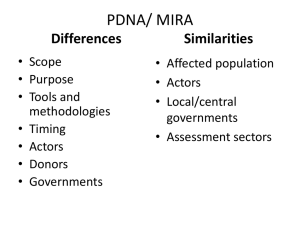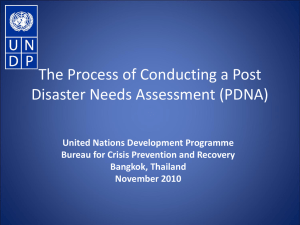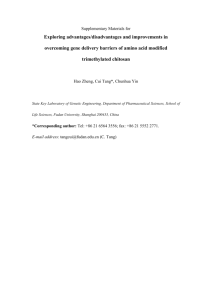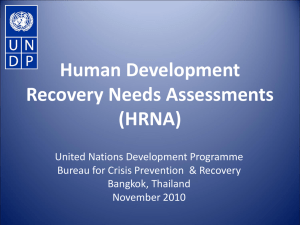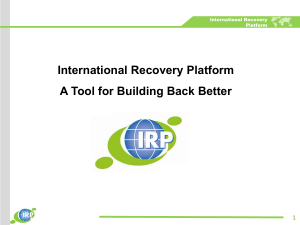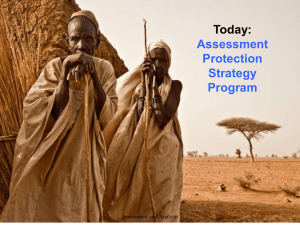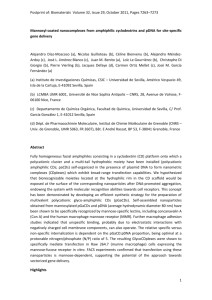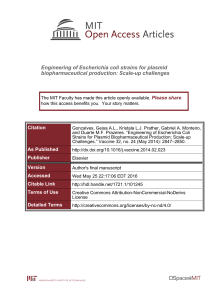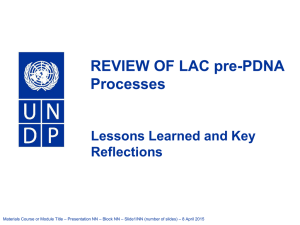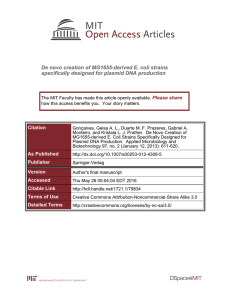Presentation by NIDM on PDNA - National Disaster Management in
advertisement
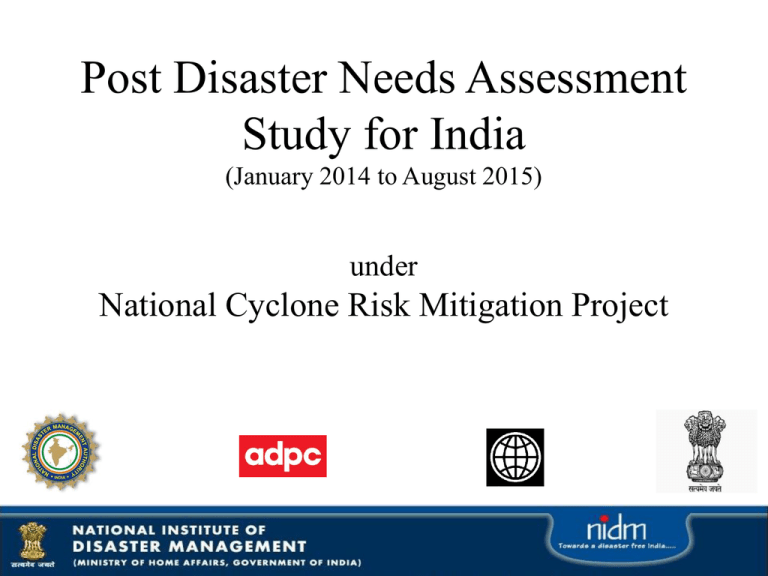
Post Disaster Needs Assessment Study for India (January 2014 to August 2015) under National Cyclone Risk Mitigation Project WHY Post Disaster Needs Assessment (PDNA) Study for India ? • Lack of a standard protocol for PDNA • In the name of PDNA, focus only on Damage as the Replacement value of totally or partially destroyed physical assets • Losses in the flow of economy unaccounted for • Impact of disasters on social sectors unaccounted for WHAT We Want to Achieve through this Study? Evolving Tools and Techniques, to be integrated with in the existing system, to Include: • Damage as the replacement value of destroyed physical assets that MUST be included in the Recovery and Reconstruction process • Losses in the flow of economy that arise from temporary Absence of damaged assets • Socio-economic Losses- livelihood etc • Environmental Losses • Impact on post-disaster Economic performance Objectives • To evolve standardized PDNA tools relevant to India • To revamp the entire system of Post Disaster Needs Assessment in India as per the new PDNA tools • Provide recommendations for integrating the new PDNA tools in the existing procedures • Identification and building the capacities/ advocacy of relevant stakeholders • Create a panel of experts for subsequently undertaking assessments using the new PDNA tools Scope of the Study Jammu & Kashmir Bihar Assam Uttarakhand West Bengal Odisha Gujarat Andhra Pradesh Maharashtra Tamil Nadu * Selection of States has been done based on the geography, experience of states in conducting some Damage and Needs Assessment study and nature of disaster proneness Activities Envisaged Task 1 Activities Development of Standardized PDNA tools for India 1.1 Comprehensive assessment of existing PDNA procedures in the 10 project states in India 1.2 Analyze the international methodologies for PDNA and assess their suitability in Indian context 1.3 Develop standardized PDNA tools and techniques for India so as to accurately formulate and prioritize needs for: •Immediate response and relief measures AND •Long term measures * Considering socio-economic, micro-economic losses, environmental and financial losses 1.4 Develop Standard format for 3 stages post- disaster •Situation report immediately after the disaster •Interim report consisting direct damages •Final report for PDNA for recovery program 1.5 Creation of PDNA format for standardized web based data capturing and authentication, with geo-referencing Task 2 Activities Dissemination of the tools and trainings 2.1 Develop a training module 2.2 Conduct 2 ToTs and 3 regional training programmes 2.3 Develop a roster of trained PDNA professionals in India 3 White paper on Accounting for Private sector losses 3.1 Prepare Indian and International review of private sector damage and losses 4 Pilot Testing of PDNA tools 4.1 Coordinate through NIDM for PDNA tools implementation in target district 4.2 Conduct PDNA training – with trained trainers, if possible 4.3 Provide technical support to implement PDNA 4.4 Prepare review and make necessary revisions in PDNA tools Cooperation from States During field visits & In selection of Districts/Blocks/Revenue unit Collection of data from relevant departments Sharing experience Suggestions for improvement and implementation all over the country THANK YOU
